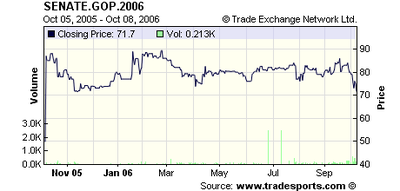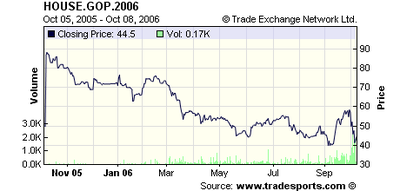![]()
[This article is cross-posted from Major Wager.]
–
A recent article in the prestigious academic journal Science (May 16, 2008, Vol 320, p. 877-8) once again makes the case for regulated prediction markets, more commonly known as “-betting exchanges”- to online gamblers. The authors make the case that such markets are useful in forecasting future events with less error than traditional measures such as polling. This argument is hard to ignore, with the authors including 21 top economists from such esteemed institutions as Yale, Stanford, Berkeley, and the University of Pennsylvania. Notable among the authors is Justin Wolfers from the Wharton School of business at UPenn, an economist who has gained notoriety in gambling circles due to his work on such topics as NBA referee bias (highlighted in a May 2008 article from MajorWager: http://www.majorwager.com/index.cfm?page=27&-show_column=660).
The concept behind using prediction markets as a decision-making tool is simple. “-Shares”- are made available on an open market, and the participants use their capital (and the promise of profits) to make predictions on future events, which is incorporated into the share price. In general, information tends to be widely dispersed, and a market allows wide-ranging opinions to be gathered and consolidated into a market-wide prediction. In other words, an infinite amount of opinions can be aggregated, and an open market with potential for profit provides an incentive for individuals to make their opinions publicly known.
Prediction markets always get more than their fair share of press near the end of the 4-year U.S. Presidential election cycle. The Iowa Electronics Market, housed at the University of Iowa, is perhaps the most well-known. The authors of the Science paper show that, in the week immediately preceding the Presidential elections from 1988 through 2000, the Iowa Electronic Markets erred by an average of only 1.5 percentage points from the actual vote results, while the traditional Gallup poll was off by 2.1%. Numerous other studies have shown the superiority of markets compared to other forecasting tools.
Of course, there have been some dust-ups regarding prediction markets in the past, most notably the “-terrorist strike market”-, unveiled a little too close to 9/11 to be palatable to the general public. The official name was the “-Policy Analysis Market“-, and it was established by the Pentagon to act as a prediction market for Middle East political events. It was quickly scuttled after heated comments from U.S. Senators, calling it “-grotesque”- and “-stupid”-, due to the perception of using catastrophic events such as assassinations as profit-making tools. Regardless of its political correctness (and the misinformed opinions of a few politicians), such a prediction market still holds value as a glimpse into the collective mindset of everyone with an understanding of political currents in the region. Utilizing such a prediction market as a component of foreign policy decisions may have ultimately spared the U.S. much grief in Iraq.
In recent years, prediction markets have grown beyond academic and government roles. Dublin-based InTrade is rapidly growing and provides many more options than the Iowa Electronic Markets. Others such as MatchBook have focused more on sporting contests, but provide coverage of other events as demand calls. Of course, those outside the U.S. have access to the largest betting exchange of them all, the massive European markets of BetFair. The success of these exchanges speaks to the public interest and feasibility of prediction markets.
One factor holding back the growth of online prediction markets is their close association with the quasi-legal world of sports betting and internet casinos. InTrade has been fairly proactive in this regard, spinning off from Tradesports to clean up its corporate slate, but it is still knee-deep in the legal sludge surrounding offshore “-gambling”-. All have to deal with the legal and financial hurdles of operating offshore.
The authors of the Science paper propose that clarification of internet gambling laws is needed to exploit the benefits of prediction markets within the United States. Clearly, the Unlawful Internet Gambling Enforcement Act (UIGEA) of 2006 is one such mechanism restricting the widespread use of prediction markets. Another is the Commodity Futures Trading Commission (CFTC), the regulatory agency which oversees futures markets in the U.S. The CFTC has provided a “-no-action letter”- to the Iowa Electronic Markets, an assurance that they will not seek any enforcement action against the exchange. However, this protection is not absolute and may not trump state and federal law if challenged. The Science authors propose a number of legal reforms which will allow prediction markets to begin to gain acceptance within the U.S. financial regulatory structure.
By no means does the Science article condone large-scale public markets, at least not initially. They take a (typically academic) conservative approach, recommending new legal framework to allow for the establishment of small markets with limited scope so as to evaluate the promise and use of prediction markets. But baby steps are going to be a necessity in the growth and acceptance of regulated public markets.
Clearly, there are negative aspects to financial markets, and regulation certainly has its place. Bear Sterns, Enron, the S&-L scandal of the 80s, and the current housing bubble all caused tremendous loss of wealth resulting from missteps in the financial markets. The current oil crisis is due at least in part to speculation, leading to the introduction of no less than 9 separate bills in the U.S. Congress seeking tougher regulation over the trading of commodities. However, the existence of problems in the financial markets does not necessitate their dissolution. Likewise, prediction markets are sure to encounter bumps in the road, but their utility should far outweigh the risks.
Should prediction markets be legalized in the U.S.? Almost certainly. They would have benefit across numerous industries, from business decisions to political policies to financial forecasting. Unfortunately, this would require building an unlikely bridge over the Puritanical moral moat placed around gambling in the U.S. But there is no inherent difference in betting on who will win in an election than what the price of oil will be in 6 months, or what the S&-P 500 will close at on a particular date. Distancing prediction markets from “-illegal”- gambling, and instead likening them to regulated financial markets, will be a necessary first step towards broader acceptance.
The academic groundwork on prediction markets has already been laid, and offshore exchanges have begun to turn these concepts into functioning businesses. As these markets grow and begin incorporating more diverse opinions, we can expect their success rate at predicting the future to only grow. To restrict such a promising tool simply due to its perception that it is a gambling outlet is silly indeed.
6-25-08
Jay Graziani
MajorWager.com
[email protected]
–
[This article is cross-posted from Major Wager.]
–

























 Author Profile -Editor and Publisher of Midas Oracle .ORG .NET .COM —- Chris Masse’-s mugshot —- Contact Chris Masse —- Chris Masse’-s LinkedIn profile —- Chris Masse’-s FaceBook profile —- Chris Masse’-s Google profile —- Sophia-Antipolis, France, E.U. Read more from this author…-
Author Profile -Editor and Publisher of Midas Oracle .ORG .NET .COM —- Chris Masse’-s mugshot —- Contact Chris Masse —- Chris Masse’-s LinkedIn profile —- Chris Masse’-s FaceBook profile —- Chris Masse’-s Google profile —- Sophia-Antipolis, France, E.U. Read more from this author…-
